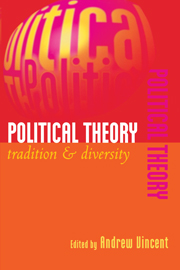Book contents
- Frontmatter
- Contents
- Preface
- List of Contributors
- Introduction
- 1 Political Theory and Conceptual Change
- 2 Political Theory and the Problem of Anachronism
- 3 Utilitarianism as a Public Philosophy
- 4 Rational Choice Political Theory
- 5 Republican Political Theory
- 6 Liberalism, Multiculturalism and Oppression
- 7 Postcolonialism and Political Theory
- 8 Legal Positivism and Political Power
- 9 Political Theory, International Theory, and the Political Theory of International Relations
- 10 Method Matters: Feminism, Interpretation and Politics
- 11 The Political Philosophy of Deleuze and Guattari
- 12 The Object of Political Theory
- Index
5 - Republican Political Theory
Published online by Cambridge University Press: 29 March 2011
- Frontmatter
- Contents
- Preface
- List of Contributors
- Introduction
- 1 Political Theory and Conceptual Change
- 2 Political Theory and the Problem of Anachronism
- 3 Utilitarianism as a Public Philosophy
- 4 Rational Choice Political Theory
- 5 Republican Political Theory
- 6 Liberalism, Multiculturalism and Oppression
- 7 Postcolonialism and Political Theory
- 8 Legal Positivism and Political Power
- 9 Political Theory, International Theory, and the Political Theory of International Relations
- 10 Method Matters: Feminism, Interpretation and Politics
- 11 The Political Philosophy of Deleuze and Guattari
- 12 The Object of Political Theory
- Index
Summary
Republican political theory takes its starting point from a long-established tradition of thinking about politics (Pocock 1975). The republican tradition is associated with Cicero at the time of the Roman republic; with a number of writers, pre-eminently Machiavelli – ‘the divine Machiavel’ of the Discourses – in the Renaissance Italian republics; with James Harrington, Algernon Sydney and a host of lesser figures in and after the period of the English Civil War and commonwealth; and with the many theorists of republic or commonwealth in eighteenth-century England, the United States and France. These theorists – the commonwealthmen (Robbins 1959) – were greatly influenced by John Locke and, later, the Baron de Montesquieu; indeed they claimed Locke and Montesquieu, with good reason, as their own. They are well represented in documents like Cato's Letters (Trenchard and Gordon 1971) and, on the American side of the Atlantic, the Federalist Papers (Madison et al. 1987).
The commonwealthmen helped to shape habits of political reflex and thought that still survive today. Their distinctive refrain had two parts: the cause of freedom rests squarely with the law and the state – it is mainly thanks to the constitution under which they live that people enjoy freedom; but the authorities are also an inherent threat and people have to strive to ‘keep the bastards honest’.
- Type
- Chapter
- Information
- Political TheoryTradition and Diversity, pp. 112 - 131Publisher: Cambridge University PressPrint publication year: 1997
- 4
- Cited by



